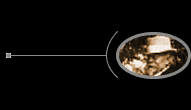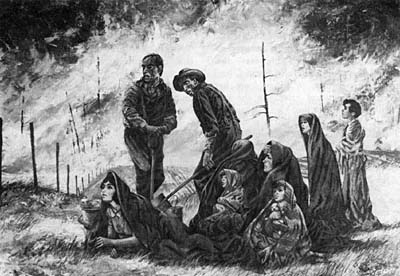


 |
  |
|
|
I CAME OUT of the river about half past three in the morning, and from that time I was in a very different condition, both morally and physically, to that in which I had previously been. Today, in recalling the past, I can see that the moment most fraught with danger was precisely that in which danger seemed at an end. The atmosphere, previously hot as the breath of a furnace, was gradually becoming colder and colder, and, after having been so long in the river, I was of course exceedingly susceptible to its chilly influence. My clothes were thoroughly saturated. There was no want of fire, and I easily dried my outer garments, but the inner ones were wet, and their searching dampness penetrated to my inmost frame, affecting my very lungs. Though close to a large fire, arising from heaps of burning fragments, I was still convulsively shivering, feeling at the same time a complete prostration of body and spirit. My chest was oppressed to suffocation, my throat swollen, and, in addition to an almost total inability to move, I could scarcely use my voice--utter even a word. Almost lifeless, I stretched myself out full length on the sand. The latter was still hot, and the warmth in some degree restored me. Removing shoes and socks I placed my feet in immediate contact with the heated ground, and felt additionally relieved. |
||
 The plight of victims in outlying areas |
||
|
I was lying beside the ruins of the large factory, the beams of which were still burning. Around me were piles of iron hoops belonging to the tubs and buckets lately destroyed.6 With the intention of employing these latter to dry my socks and shoes, now the only possessions left me, I touched them but found that they were still intolerably hot. Yet, strange to say, numbers of men were lying--some face downward--across these iron circles. Whether they were dead, or, rendered almost insensible from the effects of damp and cold, were seeking the warmth that the sand afforded me, I cannot say; I was suffering too intensely myself to attend to them. My eyes were now beginning to cause me the most acute pain, and this proved the case, to a greater or less extent, with all those who had not covered theirs during the long storm of fire through which we had passed. Notwithstanding I had kept head and face streaming with water, the heat had nevertheless injured my eyes greatly, though at the moment I was almost unconscious of the circumstance. The intense pain they now caused, joined to a feeling of utter exhaustion, kept me for a length of time extended on the earth. When able, I dried my wet garments, one after the other, at the blazing ruins, and those near me did, the same. As each individual thought of himself, without minding his neighbor, the task was easy even to the most scrupulous and delicate. Putting on dry clothes afforded immediate relief to the pain and oppression of my chest, enabling me to breathe with more ease. Finally day dawned on a scene with whose horror and ruin none were as yet fully acquainted. I received a friendly summons to proceed to another spot where the greater number of those who had escaped were assembled, but the inflammation of my eyes had rapidly augmented, and I was now perfectly blind. Someone led me, however, to the place of refuge. It was a little valley near the river's edge, completely sheltered by sand hills, and proved to be the very place where I had intended taking refuge the evening previous, though prevented reaching it by the violence of the hurricane. Some had succeeded in attaining it, and had suffered comparatively far less than we had done. The tempest of fire had passed, as it were, above this spot, leaving untouched the shrubs and plants growing within it. Behold us then, all assembled in this valley like the survivors after a battle--some safe and well, others more or less wounded; some were very much so, especially a poor old woman who, fearing to enter the river completely, had lain crouched on the bank, partly in the water, partly out of it, and, consequently, exposed to the flames. She was now stretched on the grass, fearfully burned, and suffering intense agony, to judge from her heart-rending moans and cries. As she was dying, and had asked for me, I was brought to her, though I fear I proved but a poor consoler. I could not unclose my inflamed eyes, could scarcely speak, and felt so exhausted and depressed myself, that it was difficult to impart courage to others. The poor sufferer died shortly after. Those among us who had sufficient strength for the task dispersed in different directions to seek information concerning the friends whom they had not yet seen, and returned with appalling tidings relating to the general ruin and the number of deaths by fire. One of these told me that he had crossed to the other side of the river, and found all the houses as well as the church in ashes, while numbers of corpses were lying by the wayside, so much disfigured by fire as to be beyond recognition. "Well," I replied, "since it is thus, we will all proceed to Marinette, where there is a fine church, new presbytery, and school house, capable of lodging a great number." About eight o'clock, a large tent, brought on by the Company, was erected for the purpose of sheltering the women, children, and the sick. As soon as it was prepared someone came and urged me to profit of it. I complied, and stretched myself in a corner, taking up as little place as possible, so as to leave room for others. But the man employed by the Company to superintend the erection of the tent had evidently escaped all injury to his eyes during the night, for he perceived me at once. He was one of those coarse and brutal natures that seem inaccessible to every kindly feeling though he manifested a remarkable interest in the welfare of the ladies, and would allow none but them under his tent. As soon as his glance fell on me he ordered me out, accompanying the rude command with a perfect torrent of insulting words and blasphemies. Without reply I turned over, passing beneath the canvass, and quickly found myself outside. One of the ladies present raised her voice in my defense, and vainly sought to give him a lesson in politeness. I never heard the name of this man, and rejoice that it is unknown to me. Ten o'clock arrived. After the sufferings of the night previous, many longed for a cup of hot tea or coffee, but such a luxury was entirely out of our reach, amid the desolation and ruin surrounding us. Some of the young men, after a close search, found and brought back a few cabbages from a neighboring field. The outer leaves, which were thoroughly scorched, were removed, and the inner part cut into thin slices and distributed among those capable of eating them. A morsel of cold raw cabbage was not likely to prove of much use in our then state of exhaustion, but we had nothing better at hand. At length the people of Marinette were informed of our condition, and, about one o'clock, several vehicles laden with bread, coffee, and tea arrived. These vehicles were commissioned at the same time to bring back as many of our number as they could contain. Anxious to obtain news from Marinette, I enquired of one of the men sent to our assistance if Marinette had also suffered from the fiery scourge. "Thank God, Father, no one perished, though all were dreadfully alarmed. We have had many houses, however, burned. All the mills and houses from our church down to the Bay have gone." "And the church?" "It is burned." "The handsome presbytery?" "Burned." "The new schoolhouse?" "Burned also." Ah! And I had promised the poor unfortunates of Peshtigo to bring them to Marinette and shelter them in those very buildings. Thus I found myself bereft in the same hour of my two churches, two presbyteries, and schoolhouse, as well as of all private property belonging to them or to myself. |
||
6 John Casson says in the previously cited letter: "All of the bodies were so badly charred we used iron barrel hoops under the necks and limbs to move them."